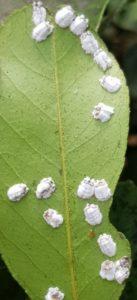- Damage to citrus crops by Pulvinaria polygonata – known as Cottony Citrus Scale, or Mango Scale
By Andrew Atkinson EXCLUSIVE
The Vega Baja regions have been hit with damage to crops of citrus trees by the disease Pulvinaria polygonata – known as Cottony Citrus Scale, or Mango Scale.
The latest concerns of citrus crop damage comes after researchers from the Agro-forestry Institute of the Polytechnic University of Valencia took samples, that laboratory analysis identified as a pest belonging to the species Pulvinaria polygonata, an identity confirmed by researchers from the University of Padua in Italy, where samples were sent in March.
The first vestiges were detected in June 2019 in orange, mandarin, clementine and lemon trees – located in the San Miguel de las Salinas, Alicante.

The accumulation of Pulvinaria polygonata molasses in leaves and branches appear in the main at the top of trees.
Pulvinaria polygonata is a coccid, belonging to the coccidae family, and is a polyphagous species that feeds on hosts belonging to ten genera and seven families, and specifically on various species of the Citrus genus.
The disease was previously known as a major mango pest, and commonly known as the Cottony Citrus Scale, or Mango Scale.
The main damages it produces are due to the suction of the sap, which weakens the tree, and to the accumulation of molasses excreted by nymphs and adult females, on which the negrillas develop.
The pulvinaria polygonata, which has been found on citrus trees in the main has also been reportedly found on species of plants.





